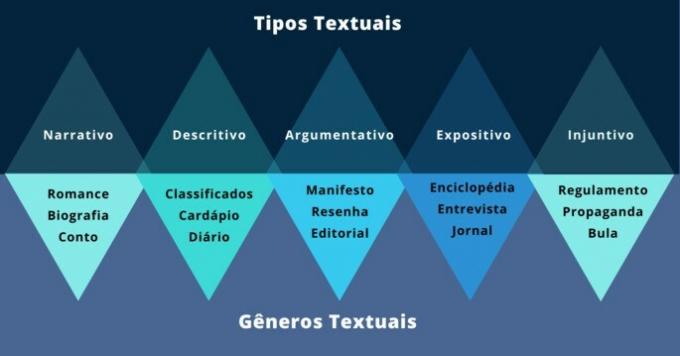Adverbial Adjunct is a accessory term of prayer who owns the adverb function. Like the word class from which it takes its name, indicates circumstance or intensifies the fact expressed by a verb, adjective or even an adverb.
According to the Normative Grammar of the Portuguese Language, the terms that are added to nouns or verbs to complement their meaning are accessory. However, if removed from the sentence, they do not compromise the understanding of the utterance. Hence the term "accessory" of its denomination.
Adverbial Adjuncts can be represented by adverbs, adverbial phrases or adverb clauses.
Examples:
- loved her hopelessly. (adverb)
- Down there is the city of Bethlehem under the midday sun. (adverbial phrase)
- lying face down, didn't even move. (adverbial clause)
Types of Adverbial Adjuncts and Examples
The adverbial adjunct, as an essential component of the grammar of the Portuguese language, presents several categories that differentiate it in terms of its function and meaning. Below, we present the main categories of adverbial adjuncts:
Adverbial Adjunct of Time
Determines when an action occurs, whether in relation to the present, past, or future. Express dates, specific times or time intervals.
Examples:
- Every morning I go out for a walk with the dog.
- "passed twenty nine months on a ship."
- "Tomorrow It will be a beautiful day, of the craziest joy imaginable."
adverbial adjunct of place
Indicates the place where the action takes place or takes place. It can range from physical places to more abstract situations.
Examples:
- I arrived to the mall At the end of the afternoon.
- Last month we spent a few days inside.
- the storm came from the China seas.
adverbial adjunct of manner
Specifies the mode, the way the action is performed.
Examples:
- Januário played the accordion slowly.
- Climb the stairs tiptoe.
- Esther ate good.
Adverbial Adjunct of Negation
It denies the action expressed by the verb or attests to the falsehood of the information.
Examples:
- No I accept being left behind in this competition.
- "No go! No leave me alone"
- Never I stopped paying my debts.
Adverbial Adjunct of Affirmation
Confirms or reinforces the idea presented in the sentence. Indicates that the action is true or that the information is correct.
Examples:
- Certainly, she will come to the meeting.
- In fact, we have few opportunities.
- Yes, Helena was sleeping.
Adverbial Adjunct of Doubt
It expresses uncertainty, insecurity regarding the action of the verb.
Examples:
- It will be that Ailton isn't coming?
- Perhaps she was right.
- chance do you understand anything about poetry?
Subject adverbial adjunct
Determines the topic or theme on which the verbal action is performed.
Examples:
- In his book, the author speaks about astronomy.
- we talk about politics during the meeting.
- The teacher taught about the renaissance in history class.
Adverbial Adjunct of Company
It indicates with whom or with what an action is performed in the sentence.
Examples:
- lived with my parents in the childhood.
- Go with God!
- I went with my daughter shopping.
Concession adverbial adjunct
It presents a logical contradiction between the action expressed by the verb and a fact or condition that, despite existing, does not prevent the occurrence of that action.
Examples:
- Despite the heavy rain, they went to the park.
- Although tired, she continued studying.
- Same with time scarce, he was able to complete the project.
Adverbial Adjunct of Conformity
Expresses that the action expressed by the verb conforms to a situation, norm or condition.
Examples:
- The employee worked according to company standards.
- The students behaved second the school rules.
- She said according to competition regulation.
adverbial adjunct of cause
Expresses the reason why an action takes place in the sentence.
Examples:
- I didn't have to get to class early. because I was in days with the tasks.
- Why do you feel so much pain?
- Millions died due to the pandemic.
End Adverbial Adjunct
Determines the purpose or purpose with which an action is performed in the sentence.
Examples:
- For what called Elizabeth?
- are you praying by penance?
- tastes like for everything,
Adverbial Adjunct of Means or Instrument
Identifies with which means, tool or instrument an action is performed.
Examples:
opened The knife the envelopes.
Give you with the whip on the loin!
strolled by bike through the streets.
Adverbial Adjunct of Intensity
Indicates the degree or intensity at which the action takes place. It can demonstrate both increase and decrease in intensity.
Examples:
- I like very from you.
- Pedrinho studies too much.
- I am indeed worried.
Adverbial Adjunct of Frequency
Determines the regularity or repetition with which an action is performed.
Examples:
- She ever get to work early.
- Us often We walk in the park on Sundays.
- He rarely miss classes.
Adverbial Adjunct of Matter
Provides information about the material, the constituent element of an object or action.
Examples:
- it was goodbye with anger and tears.
- I wrote with the feather of playfulness and the ink of melancholy.
- made lunch with the remains of yesterday.
| ADVERBIAL ADJUNCTIONS | |
|---|---|
| types | Examples |
| Of time | "passed twenty nine months on a ship." |
| from place | "The storm came from the China seas." |
| so | "Januario played the accordion slowly." |
| of denial | "No I accept being left behind in this competition." |
| of affirmation | "Certainly, she will come to the meeting." |
| of doubt | "Perhaps she was right." |
| of subject | "we talked about politics during the meeting." |
| of company | "Go with God!" |
| Grant | "Despite the heavy rain, they went to the park." |
| accordingly | "The employee worked according to company rules." |
| of cause | "Why are you in so much pain?" |
| in the end | "For what called Elizabeth?" |
| Of medium or instrument | "Give you with the whip on the loin!" |
| of intensity | "I like very from you." |
| of frequency | "She ever come to work early." |
| of matter | "made lunch with the remains of yesterday." |
Bibliography:
- BECHARA, Evanildo. Modern Portuguese Grammar. Rio de Janeiro: Editora Lucerna, 1999.
- CUNHA, Celso; CINTRA, Lindley. New grammar of contemporary Portuguese. Lisbon: Editions João Sá da Costa, 1991.
See too:
- Adverb
- Adjective
- examples of adjectives
- Pronoun
- Preposition



